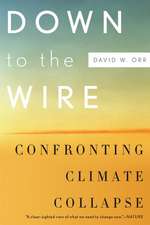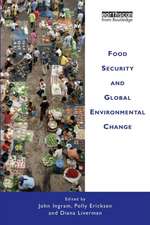Indoor Air Pollution: Part F: The Handbook of Environmental Chemistry, cartea 4F
Editat de Peter Pluschkeen Limba Engleză Hardback – 27 sep 2004
| Toate formatele și edițiile | Preț | Express |
|---|---|---|
| Paperback (1) | 1544.00 lei 43-57 zile | |
| Springer Berlin, Heidelberg – dec 2010 | 1544.00 lei 43-57 zile | |
| Hardback (1) | 1091.84 lei 38-44 zile | |
| Springer – 27 sep 2004 | 1091.84 lei 38-44 zile |
Din seria The Handbook of Environmental Chemistry
- 18%
 Preț: 1819.46 lei
Preț: 1819.46 lei - 18%
 Preț: 1827.32 lei
Preț: 1827.32 lei - 18%
 Preț: 2102.76 lei
Preț: 2102.76 lei - 18%
 Preț: 2089.35 lei
Preț: 2089.35 lei - 18%
 Preț: 2481.57 lei
Preț: 2481.57 lei - 18%
 Preț: 1223.43 lei
Preț: 1223.43 lei - 5%
 Preț: 1419.56 lei
Preț: 1419.56 lei - 15%
 Preț: 639.41 lei
Preț: 639.41 lei -
 Preț: 392.97 lei
Preț: 392.97 lei - 5%
 Preț: 366.56 lei
Preț: 366.56 lei - 18%
 Preț: 1826.69 lei
Preț: 1826.69 lei - 15%
 Preț: 640.71 lei
Preț: 640.71 lei - 18%
 Preț: 728.91 lei
Preț: 728.91 lei - 5%
 Preț: 1424.89 lei
Preț: 1424.89 lei - 18%
 Preț: 1225.94 lei
Preț: 1225.94 lei -
 Preț: 386.00 lei
Preț: 386.00 lei - 18%
 Preț: 732.70 lei
Preț: 732.70 lei - 15%
 Preț: 641.53 lei
Preț: 641.53 lei - 5%
 Preț: 1416.81 lei
Preț: 1416.81 lei - 15%
 Preț: 644.82 lei
Preț: 644.82 lei - 5%
 Preț: 1421.76 lei
Preț: 1421.76 lei -
 Preț: 386.39 lei
Preț: 386.39 lei -
 Preț: 389.49 lei
Preț: 389.49 lei - 5%
 Preț: 719.02 lei
Preț: 719.02 lei - 5%
 Preț: 714.63 lei
Preț: 714.63 lei - 18%
 Preț: 1215.22 lei
Preț: 1215.22 lei -
 Preț: 392.97 lei
Preț: 392.97 lei - 18%
 Preț: 1832.08 lei
Preț: 1832.08 lei - 15%
 Preț: 639.73 lei
Preț: 639.73 lei - 5%
 Preț: 1925.56 lei
Preț: 1925.56 lei -
 Preț: 381.98 lei
Preț: 381.98 lei - 5%
 Preț: 363.97 lei
Preț: 363.97 lei -
 Preț: 386.00 lei
Preț: 386.00 lei - 5%
 Preț: 1423.39 lei
Preț: 1423.39 lei - 15%
 Preț: 643.16 lei
Preț: 643.16 lei -
 Preț: 383.12 lei
Preț: 383.12 lei - 15%
 Preț: 642.51 lei
Preț: 642.51 lei - 5%
 Preț: 716.09 lei
Preț: 716.09 lei - 5%
 Preț: 1407.87 lei
Preț: 1407.87 lei - 18%
 Preț: 1231.01 lei
Preț: 1231.01 lei
Preț: 1091.84 lei
Preț vechi: 1436.63 lei
-24% Nou
Puncte Express: 1638
Preț estimativ în valută:
208.92€ • 218.72$ • 172.87£
208.92€ • 218.72$ • 172.87£
Carte tipărită la comandă
Livrare economică 02-08 aprilie
Preluare comenzi: 021 569.72.76
Specificații
ISBN-13: 9783540210986
ISBN-10: 3540210989
Pagini: 288
Dimensiuni: 155 x 235 x 21 mm
Greutate: 0.59 kg
Ediția:2004
Editura: Springer
Colecția Springer
Seriile The Handbook of Environmental Chemistry, Air Pollution
Locul publicării:Berlin, Heidelberg, Germany
ISBN-10: 3540210989
Pagini: 288
Dimensiuni: 155 x 235 x 21 mm
Greutate: 0.59 kg
Ediția:2004
Editura: Springer
Colecția Springer
Seriile The Handbook of Environmental Chemistry, Air Pollution
Locul publicării:Berlin, Heidelberg, Germany
Public țintă
ResearchDescriere
Indoor
Air
Pollution
has
become
a
major
topic
in
environmental
research
and
health.
Most
people
spend
more
than
80%
of
their
time
in
buildings
and
are
exposed
to
a
broad
range
of
pollutants
from
indoor
sources
such
as
building
materials,
furniture,
carpets
and
textiles,
heating
and
cooking,
household
and
consumer
products,
etc.
The
volume
provides
a
comprehensive
review
of
the
major
indoor
air
pollutants:
volatile
organic
compounds,
biocides,
indoor
particles
and
fibres,
combustion
products
and
micro-organisms
and
their
metabolites.
Sources
and
sinks
of
air
pollutants
in
indoor
environments
and
their
chemistry
are
distinctly
different
from
ambient
air
pollution,
even
though
the
latter
may
influence
indoor
air
quality.
Adsorption
and
desorption
processes,
the
pollutant
source
dynamics,
gas
phase
reactions
and
kinetics
-
including
the
fate
and
final
chemical
destiny
of
chemically
unstable
intermediate
compounds
-
are
topics
of
scientific
research
as
well
as
the
evaluation
of
their
sensory
impact
and
irritation
potential.
Guidelines
for
assessing
indoor
pollution
and
a
broad
range
of
analytical
methods
have
been
recently
developed
and
are
reviewed
by
internationally
renowned
scientists.
The
specific
characteristics
of
indoor
air
pollution
in
developing
countries
due
to
the
widespread
use
of
open
fires
for
cooking,
heating
and
lighting
are
analysed
as
well
as
the
Chinese
strategies
to
address
the
growing
pollution
problems
by
air
pollution
in
its
modern
building
stock.
Cuprins
G.
Ayoko:
Organic
Compounds
(VOC)
in
Indoor
Environments.
Sources
-
Reactivity
-
Impact
on
Indoor
Air
Quality.-
T.
Salthammer:
Emissions
of
Volatile
Organic
Compounds
from
Products
and
Materials
in
Indoor
Environments.-
B.
Tichenor:
Adsorption
and
Desorption
of
Pollutants
to/from
Indoor
Surfaces.-
W.
Butte:
Sources
and
Impacts
of
Pesticides
in
the
Indoor
Environments.-
L.
Morawska:
Indoor
Particles,
Combustion
Products
and
Fibres.-
H.
Schleibinger:
Indoor
Air
Pollution
by
Micro-organisms
and
Their
Metabolites.-
P.
Bluyssen:
Sensory
Evaluation
of
Indoor
Air
Pollution
Sources.-
K.
Balakrishnan:
Biomass
Smoke
and
Health
Risks
-
The
Situation
in
Developing
Countries.-
H.
Jiming:
Strategies
for
Healthy
Indoor
Environments
-
a
Chinese
view.
Recenzii
From
the
reviews:
"The main focus of the book is sources, methods of detection, and measurement results for volatile organic pollutants, particulates, pesticides, and microorganisms. … The references are up-to-date, and the tables of definitions and acronyms will be very helpful to those who are not familiar with this field. Academic libraries supporting environmental programs should consider purchasing this volume … . Summing Up: Highly recommended. Upper-division undergraduates through professionals; two-year technical program students." (H.E. Pence, CHOICE, Vol. 42 (11), July, 2005)
"Indoor Air pollution is … part of the fourth of a five-volume series on environmental chemistry. … It contains a wealth of useful information and references on the latest research into indoor air quality, and will be a very valuable resource for researchers and academics working in this area. It is written in a style accessible to senior undergraduate science students. … This book is both a valuable teaching resource and an excellent introduction to research being undertaken in indoor air quality. " (Nichola Porter, Chemistry in Australia, June, 2005)
"The main focus of the book is sources, methods of detection, and measurement results for volatile organic pollutants, particulates, pesticides, and microorganisms. … The references are up-to-date, and the tables of definitions and acronyms will be very helpful to those who are not familiar with this field. Academic libraries supporting environmental programs should consider purchasing this volume … . Summing Up: Highly recommended. Upper-division undergraduates through professionals; two-year technical program students." (H.E. Pence, CHOICE, Vol. 42 (11), July, 2005)
"Indoor Air pollution is … part of the fourth of a five-volume series on environmental chemistry. … It contains a wealth of useful information and references on the latest research into indoor air quality, and will be a very valuable resource for researchers and academics working in this area. It is written in a style accessible to senior undergraduate science students. … This book is both a valuable teaching resource and an excellent introduction to research being undertaken in indoor air quality. " (Nichola Porter, Chemistry in Australia, June, 2005)
Textul de pe ultima copertă
Indoor
Air
Pollution
has
become
a
major
topic
in
environmental
research
and
health.
Most
people
spend
more
than
80%
of
their
time
in
buildings
and
are
exposed
to
a
broad
range
of
pollutants
from
indoor
sources
like
building
materials,
furniture,
carpets
and
textiles,
heating
and
cooking,
household
and
consumer
products,
etc.
The
volume
provides
a
comprehensive
review
on
the
major
indoor
air
pollutants:
volatile
organic
compounds,
biocides,
indoor
particles
and
fibres,
combustion
products
and
micro
organisms
and
their
metabolites.
Sources
and
sinks
of
air
pollutants
in
indoor
environments
and
their
chemistry
are
distinctly
different
from
ambient
air
pollution
even
though
the
latter
may
influence
indoor
air
quality.
Adsorption
and
desorption
processes,
the
pollutant
source
dynamics,
gas
phase
reactions
and
kinetics
-
including
the
fate
and
final
chemical
destiny
of
chemically
unstable
intermediate
compounds
-
are
topics
of
scientific
research
as
well
as
the
evaluation
of
their
sensory
impact
and
irritation
potential.
Guidelines
for
assessing
indoor
pollution
and
a
broad
range
of
analytical
methods
have
been
recently
developed
and
are
reviewed
by
internationally
renowned
scientists.
The
specific
characteristics
of
indoor
air
pollution
in
developing
countries
due
to
the
widespread
use
of
open
fires
for
cooking,
heating
and
lighting
are
analysed
as
well
as
the
Chinese
strategies
to
address
the
growing
pollution
problems
by
air
pollution
in
its
modern
building
stock.
Caracteristici
State-of-the-art
report
on
the
impact
of
a
broad
scale
of
chemical
and
biological
agents
on
indoor
environments
Highlights the situation in China and developing countries
Highlights the situation in China and developing countries












